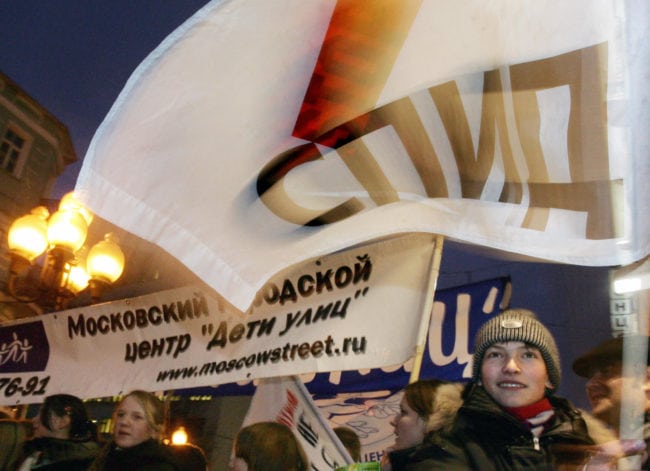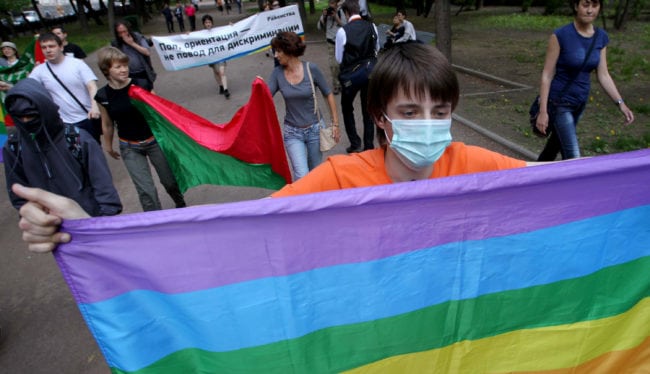HIV prevention charity wins rare federal grant in Russia

A Russian FrontAIDS with a Red Ribbon, a sign of support for people living with HIV on his cap protests in downtown Moscow, 28 November 2006 (Photo by Denis Sinyakov/AFP/Getty Images)
A Russian HIV charity focusing on preventing the spread of the virus among gay men has received a rare federal grant enabling it to conduct its activities in Yekaterinburg.
The grant of around 100,000 rubles (£1,200) was the first awarded to charity workers involved in the “To live” project. Charity workers may approach people in nightclubs and offer them to take an HIV test and, should the result show a positive, would offer to accompany them to a local AIDS centre. Part of the money will be spent on renting a room close to the centre.
“This is a very discriminated group, and this group is difficult to find money for,” the project’s director Nadezhda Dernova told Russian news outlet Current Time. “To be honest I did not think we’d be awarded the grant, but the guys who worked with me were confident we’d get it,” she added.

A Russian boy holds banner reading ‘Stop AIDS’ during a march in central Moscow, 1 December 2005 marking the World AIDS Day (Photo by Denis Sinyakov/AFP/Getty Images)
Healthcare officials in Yekaterinburg, the country’s fourth-largest city located east of the Ural Mountains, declared an HIV “epidemic” in 2016 after it was estimated that 1.8 percent of local residents where infected with the virus. The majority of the cases, 52 percent, were due to drug use, while in 46 percent of the cases the virus spread through unprotected sexual contact.
Russian authorities have overall being reluctant to publicly discuss the extent of the public health crisis, even though the problem continues to grow. Only last year the country recorded the third highest number of new HIV cases in the world, behind South Africa and Nigeria.
Yet, in 2017 the Russian government refused to allocate additional funds in the budget to fight the spread of HIV and treat patients, limiting the amount to 17.5 billion rubles (£210 million). The director of Russia’s Federal AIDS Center Vadim Pokrovsky told Radio Free Europe at the time that at least five times that amount was needed for effective prevention and treatment.

Members of the Russian gay community, and gay rights activists, carry flags during a rally in Moscow, on May 22, 2011 (Photo by Alexey Sazonov/AFP/Getty Images)
“The [current] budget only allows 300,000 people to undergo treatment,” he said, adding: “The government and the State Duma [the Russian legislative assembly] must significantly increase this budget if they don’t want to see tens of thousands more people dying.”
A lack of funding is not the only obstacle to tackling the epidemic in the country. The World Health Organisation warned already four years ago that the country’s “repressive drugs and homosexuality laws” would have a negative impact in the fight against HIV.
One of the few representatives of the Yekaterinburg LGBT+ community who openly lives with HIV, Vitaly Melkovsky, told Current Time the health crisis was aggravated by the stigma and discrimination associated with the virus and the disease. “We are losing the war on HIV in Yekaterinburg” he said, “There is one story about the epidemic in Yekaterinburg, the huge number of people who live with HIV, and there is another story about stigma and discrimination.”

